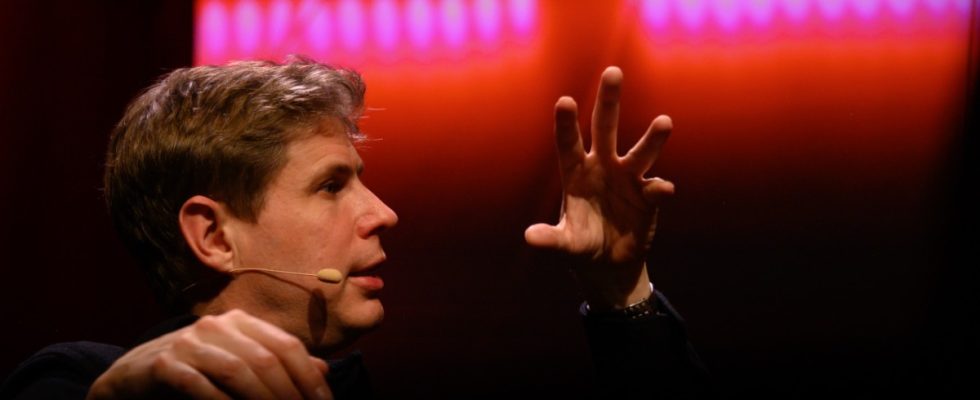From outside it goes inside and then it’s almost the end again: Daniel Kehlmann knows exactly what he wants to tell and how he wants to tell stories. That’s why he divided his new novel “Lichtspiel” into three chapters Outside inside and Thereafter. The best-selling author cleverly draws the reading audience into a story about a left-wing film artist who surrenders himself to the National Socialists; it is about artistic integrity, corruptibility and life under a dictatorship. The 48-year-old tells this in three large chapters; this division can also be used in his reading as part of the Munich Literature Festival.
Outside So it starts: It’s snowing on this Tuesday evening in November, the path from the S-Bahn at Rosenheimer Platz to the Muffathalle is icy. The reading was moved there due to high demand; later every seat in the hall will be occupied. Kehlmann’s audience doesn’t let the external adversities deter them; they move down the mountain like a caravan. A woman reaches out to her companion and tests his literacy by asking about the shortlisted titles for the German Book Prize. Just a breath later she asks which Kehlmann he likes best: “Measuring the World”, “Fame” or “Tyll”? This also seems to be a test, because the person being asked ironically evades: “I’m not into him, but I’m into his books.”
Inside There are two leather chairs on the stage and hundreds of chairs in front of them. There are long queues at the beer stand and in front of the book table, the only thing missing is the stand with the fan shirts. It starts on time, SZ editor Christian Mayer moderates, the reading will be feature length. The writer, dressed entirely in artist’s black, reads two chapters from “Lichtspiel” with a good feeling for punch lines, and film excerpts are shown in between. Kehlmann is a native of Munich, so the evening should be a kind of home game for him. He has never been to the literature festival before, so the reading is a premiere. In 1997 he read his first novel next door in the Muffatcafé, but only four or five guests came.
“Who is that?” a lady asks at one point in the novel. “The Pope,” the person opposite answers. “The pope?” “Not the Holy Father, the director.” This difference is also pointed out right at the beginning of the reading: So it’s about the Pabst with a soft “b”, about the film director Georg Wilhelm Pabst. Kehlmann says he has wanted to write a director’s novel for a long time and that the job fascinates him. He is also friends with more directors than with writers.
He found the perfect material in Pabst’s “reverse emigration story”: The Austrian, who became known for silent films such as “The Joyless Lane” and “Pandora’s Box”, was already working in Hollywood in 1934, but returned to his homeland – and later filmed under Goebbels Films for the National Socialist rulers. Nevertheless, Kehlmann claims: “This is my funniest book.” The Nazi regime was terrible, “but also completely ridiculous.” So it’s about the funny in the terrible.
Kehlmann in conversation with SZ editor Christian Mayer.
(Photo: Alessandra Schellnegger)
Thereafter It gets personal: Daniel Kehlmann talks about his grandparents, who were Jews and pretended to be “half-Jews” in order to survive the Nazi era. His father Michael was born in 1927 and was sent to a concentration camp shortly before the end of the war. “He also experienced everyday school life during the Third Reich,” says the son. He often talked about this later, and a lot of it was incorporated into the book. There is also a lot to talk about on this entertaining evening, but after 90 minutes it’s over.
But it’s not over: a long line stretches through the hall, at the end of which the author stands and signs his books. A concerned reader asks how he feels afterwards. “Do you have hand cramps?” “No, that never happens,” replies Kehlmann. “I also write all of my books by hand.”

